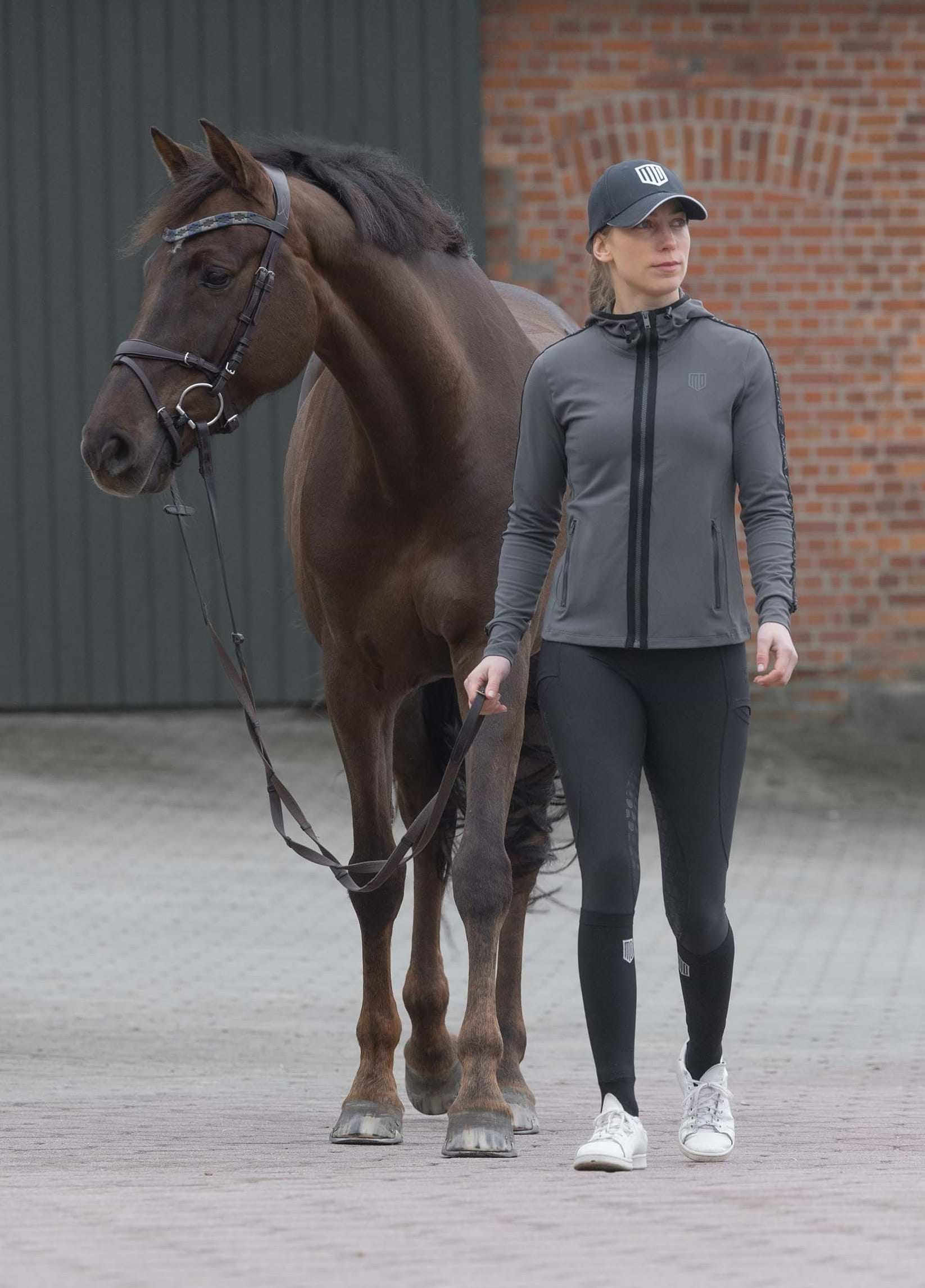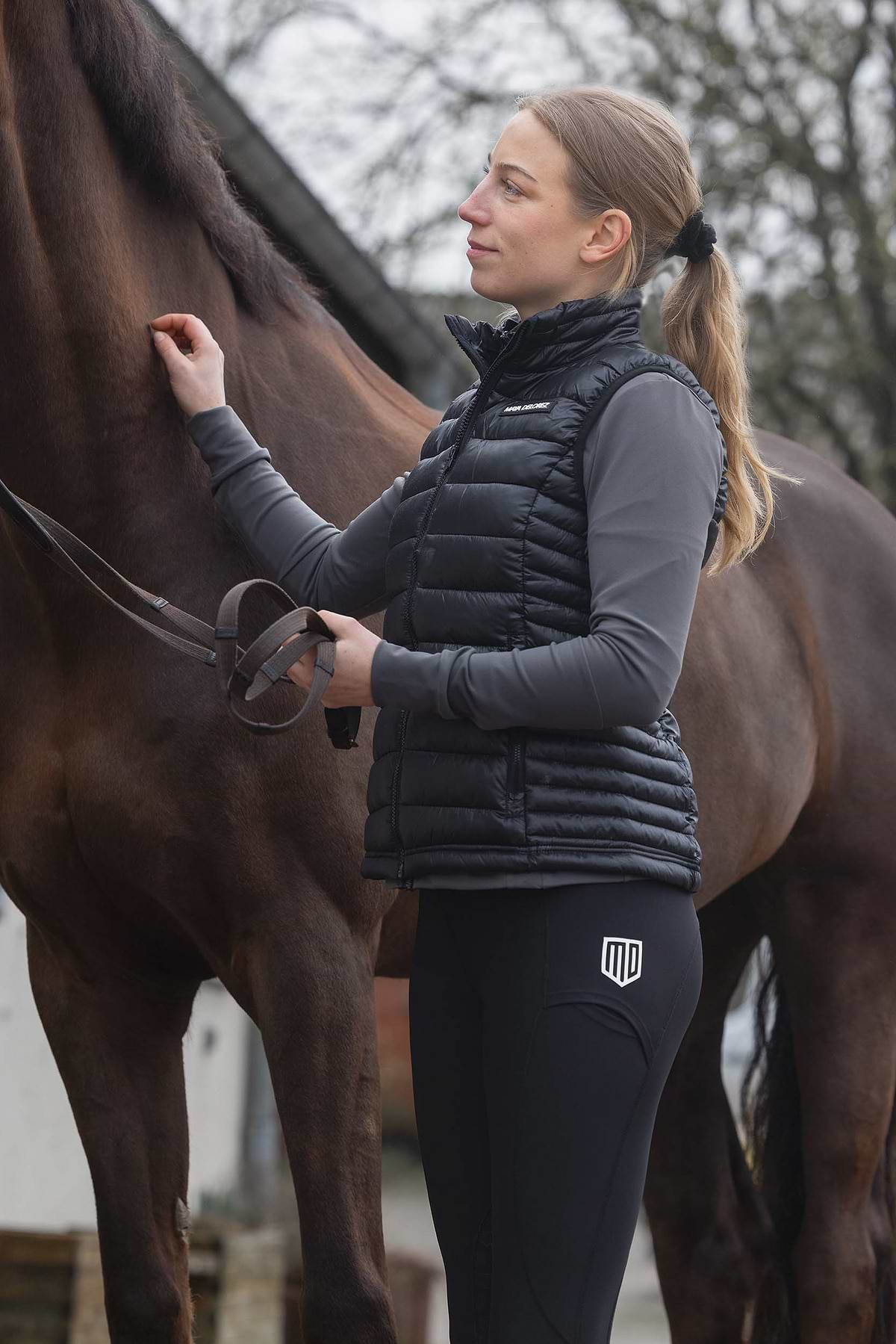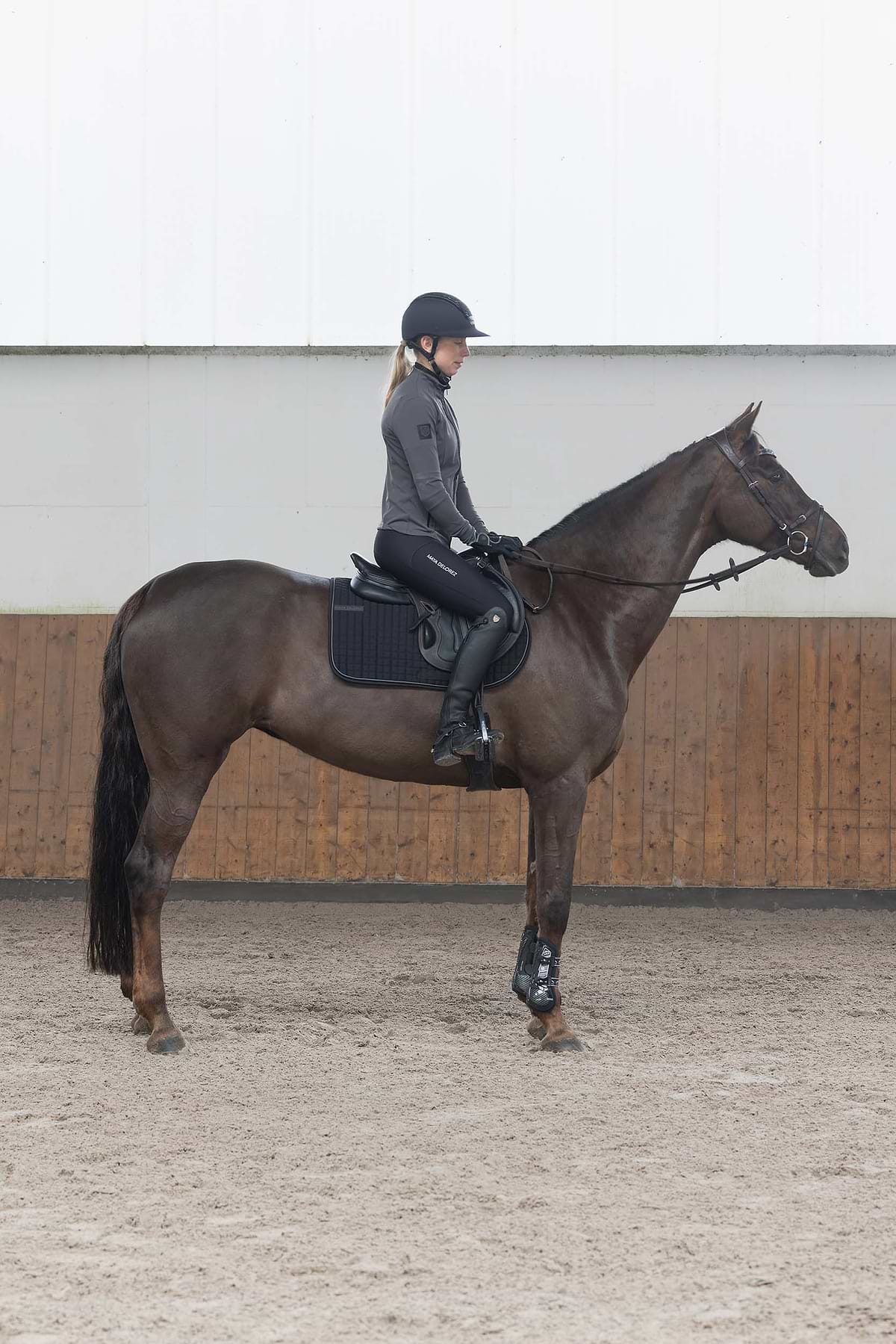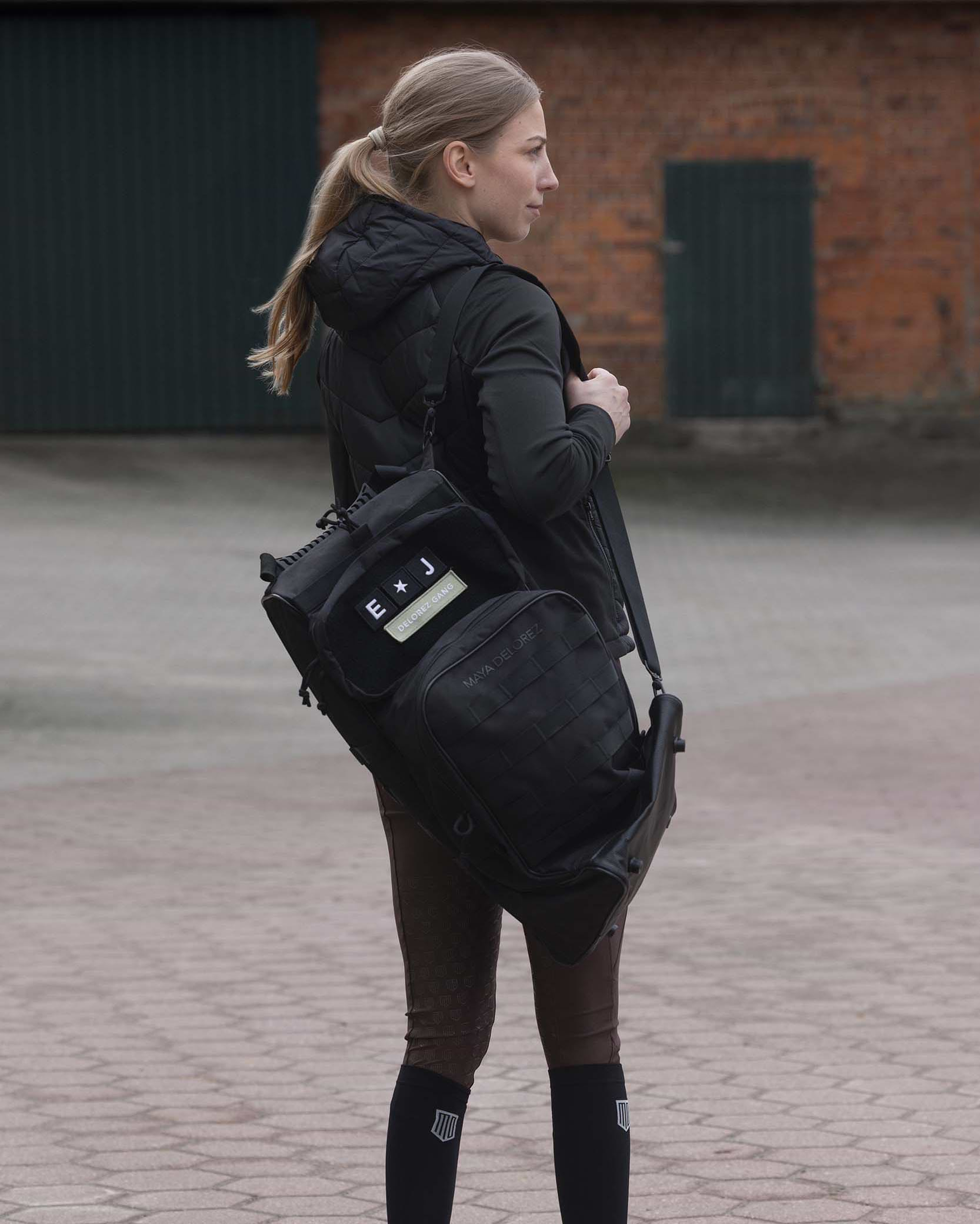Ebba Johansson
On Her Career in Germany
Get to know Team Rider Ebba Johansson! In this article, she tells all about her career in Germany, and her years as Chief Rider at Holsteiner Verband.
Lovisa
Fri 17 May - 24

Ebba Johansson
On Her Career in Germany
Get to know Team Rider Ebba Johansson! In this article, she tells all about her career in Germany, and her years as Chief Rider at Holsteiner Verband.
Lovisa
Fri 17 May - 24
At seven years old, she competed for the first time with her Dartmoor Pony that refused to jump – in 2017, she stepped in as Chief Rider at Holsteiner Verband in Germany. Ebba Johansson’s career has been marked by success, challenges, perseverance, and joy. Looking back at the choices that got her to where she is today, she says that “I wouldn’t have done it any other way”. Ebba’s journey is a reminder to go your own way and shows us that it’s possible to realize your childhood dreams.
About Ebba Johansson
Born: March 20, 1993
Lives in: Hamburg, Germany 🇩🇪
Grew up in: Heby, Sweden 🇸🇪
Occupation: Coach and young horse trainer
Instagram: @johanssonebba1
When we call Ebba up for an interview, she is in Hamburg where she lives with her partner. Since becoming a competition rider in Mühlen in 2020, Ebba has been working with Paul Schockemöhle and in 2023, she began coaching riders at the breeding stable in Lewits. At the stable, they see about 1000 foals born each year and a big part of the job is to assess the horses to decide on next steps in their training. Working as a coach, which was not always a given, has allowed Ebba to develop both on a personal level and as a rider.
– I help Paul assess the young horses before they progress to the competition stables in Mühlen or go to private riders. This means that I also train young horses and riders. You have to be able to assess the horses’ potential early on, so you can decide if you want to continue dedicating a lot of time to them or if you want to sell them a bit sooner. It’s really exciting to get to see this side of things. It’s also really rewarding to coach others, especially the riders who are so dedicated and driven. What I love the most is helping others develop in their skills. The biggest challenge I face as a coach is handling the riders in different ways depending on their mindset. For some, you need to be a bit tougher, and for others that doesn’t work at all. I think that it is beneficial that I, as a coach, ride a lot myself. I understand how challenging it is, and I can get in the saddle and actually demonstrate to my students how they can ride.
What does a typical week look like for you?
Since Lewits is 62 miles outside of Hamburg, I stay in a hotel when I work there which is generally three days a week. We have a plan that we follow to make sure that everything runs smoothly despite the large number of horses that we have. It’s important that all of the horses develop a little each day.
On Tuesday, I go to work at 06.00. We start training the young horses at 07.30 and continue throughout the morning with jumping exercises. We break for lunch and then keep training throughout the afternoon. Together with the head coach, I make a list of what horses Florian (CEO of the company) will be shown on Thursday.
On Wednesday, we ride all the horses. We do jumping exercises with the green horses that might be doing their first jumps with a rider.
On Thursday, Florian comes, and I show him the horses that we selected on Tuesday. I tell him what my impressions are, and we decide on next steps. We discuss if the horse needs another week or if it’s ready for the competition stable in Mühlen or if it should go to a private rider.
My weeks can also look completely different. For example, at the start of the year, me and Paul do loose jumping with the young horses that have not been broken in yet so that we can assess them. We do this with roughly 300 horses and Paul shares his thoughts with me on how he assesses them. I learn an incredible amount from him and there’s probably no one that has seen as many jumping horses at the top level as Paul has. I also travel a lot and occasionally go to Florida to train clients and try out horses. In two weeks, I am going to Mexico to ride horses that are up for auction. Having such a varied everyday life and meeting so many different people is great.
When Ebba describes her life today, it’s hard not to wonder what seven-year-old Ebba would have thought if she could have seen herself now. When she was growing up in Heby, Ebba trained ponies from scratch that were then sold to allow her to gradually buy better and better ponies. The dream of working with horses full-time was always there but it wasn’t something that she spoke of out loud.
“I often think about the fact that I am living the dream I’ve had since I was a child”.
– Ebba Johansson
– When I was seven years old, I competed for the first time with my Dartmoor Pony. He refused to jump, and I think I even fell off. I started crying because I so badly wanted to compete and progress to the next level, haha. Now, I actually often think about the fact that I am living the dream I’ve had since I was a child. Horses were the only thing on my mind, but I never dared to say out loud that I wanted to work with horses and live abroad because I didn’t think it was possible.
After graduating in 2012, Ebba moved to Germany to work as a rider at a competition stable where she stayed for two years. Then, she made the move to a stable where she was in charge of 15 horses and got to focus more on her skills in the show ring. Ebba describes the years as demanding but necessary to get her to where she is today.

– I arrived at my first job on a Tuesday and began competing young horses on the Thursday. It gave me a lot of valuable experience and I also got to ride some very different kinds of horses. In total, I had 21 horses that I competed at the same time. It was hard work but at the same time it was extremely rewarding. If I had not done those two years, I would definitely not be where I am today. Following that, I started working at a more “competition-focused” stable. My manager there was very skilled, and I learnt a lot about how to approach walking and riding the course. There is a time for everything, and each step has been equally valuable for my development as a rider.
Having worked at competition stables in Germany, Ebba was at 24 years old offered the role as Chief Rider at Holsteiner Verband. The job entailed training, competing, and preparing the stallions for tests and shows. Initially unsure if she would be able to handle the role, she finally accepted. Ebba emphasizes that her coach at Holsteiner Verband gave her essential support and highlights the importance of having a trainer that supports you fully no matter the situation.
– When they offered me the job, I told them honestly that I wasn’t sure if I would be able to handle it. But they insisted and so I thought I could always give it a go and treat it as a valuable experience. A lot of people told me that “it will never work having a girl riding the stallions and on top of that being Chief Rider”.
“It is extremely important to feel supported by your coach, regardless of if things are going well or not. Someone that backs you up in every situation and tells you when you’re on the right track.”
– Ebba Johansson
– That I felt supported by my coach when I started at Holsteiner Verband made all the difference. It is extremely important to feel supported by your coach, regardless of if things are going well or not. Someone that backs you up in every situation and tells you when you’re on the right track. He pushed me and explained that we were going to train the horses to work for me, and that I shouldn’t try to imitate their previous riders that had ridden them with a lot of force. Hearing that was incredibly helpful. I eventually found that the horses also jumped better when you rode them with less force. We focused a lot on flatwork to get the horses rideable and we very rarely jumped courses. This approach worked really well since jumping courses was part of my muscle memory from my previous jobs.
Stepping in as Chief Rider as a woman was not always easy but the idea of giving up never occurred to Ebba. By being patient and consistent and standing up for herself, she eventually found her footing.
– Initially, a big challenge was to be taken seriously by my colleagues since they had been there a lot longer and were older than me. It took a while for them to take me seriously. I also had to pick my moments and decide when it was necessary to speak up and when it was better to stay quiet. I had to try and find that balance and feel out situations and people while still continuing to stand up for myself. It was also challenging to not let myself be influenced by outside factors and the opinions of others. Reminding myself of the plan that me and my trainer had agreed on, and sticking to it, was really important in those challenging moments. There are always going to be so many different opinions and methods that you can follow but sometimes you just have to stick to what you feel works.
What advice would you give to those who want to move abroad and work with horses?
– Ask yourself what you want and why. There will be times when everything feels tough, and nothing works and, in those moments, you need to know why you are doing it and not give up. The only one that can push you forwards when things are tough is you. I would also add that you should try to not be too influenced by others and most importantly believe in yourself. Of course, you should listen to others and their advice but that’s reserved for the people that want the best for you. If you are serious about working with horses, you have to learn to prioritize the job and the horses above all else. Of course, you’re allowed to have fun and enjoy yourself, but you have to make sure that you get up in the mornings and show up on time to take care of the horses in the best possible way.

Looking back at her career, Ebba says that there are two things that were crucial to get her to where she is today: Trusting her gut and always prioritizing her continued development.
– If I could change anything, I still wouldn’t do anything different. And I think that’s mainly down to me always having done what I want to do. No matter where I have worked or what I have decided to do, there have always been people that have advised against it. In the end, I’ve always made the right choice. You have to trust your gut. Being able to learn and develop has been my driving force. It’s only when I have felt like I have done all there is to do and can’t progress further that I have wanted to move on.
What are the next steps in your career?
– In the past, I have always planned ahead but it has never gone as planned anyway, haha. Right now, I am very happy with how things are, and I feel like I am still developing, so I think I’ll continue for a few more years. I have toyed with the idea of taking on horses to train myself since I have gotten a lot of requests to do so. But at the same time, I enjoy being employed and having that safety and my everyday life. Maybe I will take on other responsibilities at the company or start to make more decisions regarding the training plans moving forwards. We’ll see what happens!


